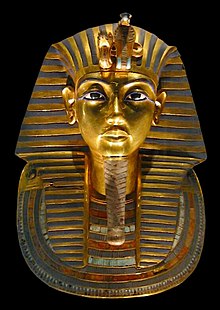Tutankhamun
English

Alternative forms
- Tutankhamen
- Tutankhamun
We only know the letters mn of the last word in the name, as the Egyptians only wrote down consonants and no vowels in their writing system, so various people fill in various vowels.
Etymology
Borrowed from Egyptian twt-ꜥnḫ-jmn (literally “Living Image of Amun”),
| |
Like most Ancient Egyptian names, the original is a phrase rather than a single word.
Pronunciation
- Lua error in Module:parameters at line 290: Parameter 1 should be a valid language or etymology language code; the value "US" is not valid. See WT:LOL and WT:LOL/E. IPA(key): /ˌtu.tɑŋˈkɑ.mən/, /ˌtu.tæŋˈkɑ.mən/
- Lua error in Module:parameters at line 290: Parameter 1 should be a valid language or etymology language code; the value "UK" is not valid. See WT:LOL and WT:LOL/E. IPA(key): /ˌtuːtənˈkɑːmən/
Proper noun
Tutankhamun
- Egyptian Pharaoh known for his young age, for the restoration of Egyptian religion, and for being the only Pharaoh whose tomb was preserved intact to the modern age.
Derived terms
Translations
Egyptian Pharaoh
|
See also
Portuguese
Proper noun
Tutankhamun m
- Alternative form of Tutancâmon
Categories:
- English terms borrowed from Egyptian
- English terms derived from Egyptian
- English 4-syllable words
- English terms with IPA pronunciation
- English lemmas
- English proper nouns
- English uncountable nouns
- en:Ancient Egypt
- en:Individuals
- Portuguese lemmas
- Portuguese proper nouns
- Portuguese terms spelled with K
- Portuguese masculine nouns